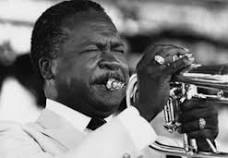Louis Smith died on August 20 at age 85. Smith was in the front ranks of modern jazz players who emerged from Memphis in the 1950s, though his 1931 birth year made him slightly older than most of the players he was showcased with on the 1959 album Young Men From Memphis. The United Artists release marked the virtual recording debut of his cousin, 21-year-old Booker Little, and 22-year-old Frank Strozier, and it was among the earliest recordings by Calvin Newborn, Phineas Newborn, Jr., and George Coleman.
Video: https://www.youtube.com/watch?v=w15w2hKlfGI
By 1959, Smith already had two outstanding Blue Note releases to his credit, Here Comes Louis Smith and Smithville; the former was recorded in 1957 for Transition Records but released on Blue Note. It featured Cannonball Adderley under the nom de disque, Buckshot Le Funke, a name that Branford Marsalis revived as an album title in 1994. Smith made his devotion to Clifford Brown evident right out of the gate as Hear Comes opens with “Tribute to Brownie.” He was the lone trumpeter on Kenny Burrell’s marathon blowing session, Blue Lights, Volumes 1 and 2, and his confident attack and melodic conception made him an ideal choice as Donald Byrd’s successor in Horace Silver’s popular quintet. For 50 years, Smith fans were frustrated by the lack of studio recordings by Silver during the trumpeter’s tenure, but in 2008 Blue Note released Horace Silver’s Newport ’58, a performance that confirmed how perfectly placed he was in the group.
Video: https://www.youtube.com/watch?v=ecmtVVRXVvM
Notwithstanding his promising start on the hotly competitive New York scene, Smith left after three months with Silver to begin a career as a teacher, first in the public schools in Atlanta, then on to his alma mater Tennessee State University, and finally to the University of Michigan, where he taught music and served as band director. He moved to Ann Arbor around 1968, and was associated with both the university and a junior high school in town. He went nearly 20 years between his early sessions and the resumption of his recording career with Steeplechase Records in 1978. Just Friends was his first release for the Danish jazz label, and it reunited him with Memphis colleagues George Coleman, Jamil Nasser, and Harold Mabern. It was followed by Prancin’, which marked a reunion between Smith and Junior Cook, his front-line mate in Silver’s quintet. They were back together again in 1991 for Strike Up the Band and this thrilling take on “Lover.”
Throughout the nineties, Smith made one fine album after another (12 altogether for Steeplechase), all distinguished by his mellifluous tone and accurate pitch. My favorites include The Very Thought of You, a marvelously intuitive duo session with Chicago piano legend Jodie Christian. and Once in a While, which features guitarist Doug Raney. Recorded in 1998, it appears to be Smith’s only outing with a guitarist as his front-line partner. Sadly, Doug preceded Louis in passing earlier this year on May 1 at age 59. (YouTube doesn’t have anything posted by Raney and Smith together but there’s plenty by the guitarist, including duo sessions with his legendary father Jimmy, and this 1996 recording of “Giant Steps.”)
As an almost complete absence of obituaries indicates, Smith was largely unknown to American audiences beyond Ann Arbor, but he’s left a substantial legacy. Randy Napoleon, who plays guitar with Freddy Cole’s quartet, was 14 when he first encountered Smith in the Ann Arbor public schools and continued his studies with him at Michigan. He told me, “Louis was truly a great role model. The essence of class and good taste! I’ll never forget him.” Napolean teaches at Michigan State; his recent release for Mack Avenue, Soon, features drummer Gregory Hutchinson and his Michigan State colleagues trumpeter Etienne Charles and bassist Rodney Whitaker. Here’s a taste with reflections by the guitarist on the “Rodney-Hutch groove.”
Napolean wrote movingly of Smith as both a teacher and player on Facebook. “He made it clear that musical freedom in Jazz comes from absorption of fundamentals. His advice to me that first year was, ‘Randy! Chunk Chunk Chunk (Freddie Green)’ and ‘Randy! Too loud!!!’ He was never harsh, always kind, but he wouldn’t let his students get away with any foolishness musical or otherwise. Mr. Smith impressed upon us the importance of taste and editing in music. He exemplified this in his person as well as his playing. His playing is focused and clear with no gimmicks or fluff. These days, I’m a teacher. I start my sophomore improv class with Mr. Smith’s solo on ‘Au Privave’ from the record Smithville. As usual, there isn’t a note or ornament out of place; this is a model of how to play Bebop.”
Video: https://www.youtube.com/watch?v=arMqBbSm1QY
